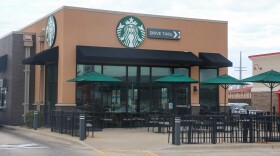Workers at the Starbucks on The Loop location voted 20-1 in favor of a union on Monday, according to initial results from the National Labor Relations Board, which oversees private-sector union elections.
Last month, Starbucks employees at the Elizabethtown store on Dixie Highway unionized in a narrow 13-11 vote.
The stores are the fifth and sixth locations in Kentucky where baristas have joined Starbucks Workers United. Employees across the country have cited concerns over issues like hourly pay, benefits and workplace safety as their reasons for organizing.
Jay Hockenberry has worked at the Starbucks on The Loop for about two years. He said scheduling is a problem at his store, which leads to understaffing and means part-time workers miss out on benefits offered by the company.
“This opens up bad opportunities in the areas of things like store hygiene, it opens up bad opportunities in the areas of guest experience,” Hockenberry said.
Part-time employees are eligible for benefits if they work at least 240 hours across three consecutive months, according to the company. That translates to about 20 hours each week for 12 weeks.
Sean Sluder said she decided to work at Starbucks on Dixie Highway to utilize the company’s transgender healthcare benefits, but she struggled to qualify for those benefits when her weekly working hours were repeatedly reduced.
She said she wants to see stable working hours through the union, and feels the company highlights the LGBTQ+ community as a “marketing tactic.”
“That gives them the good publicity. But then we get in, and if you can even get the benefits, there's a good chance you're not going to be able to keep them,” Sluder said.
Sluder said after the narrow election vote at her store, the union’s supporters want to alleviate concerns of those who voted against it.
“We're trying to get the bare minimum, and unions succeeding doesn't just help the people in the unions. It helps raise the bar for all workers, unionized or not,” she said.
Hardin County previously received attention for a legal battle against unions. In 2015, the Hardin County Fiscal Court passed a “right-to-work” ordinance that prevented private-sector employees from being required to join a union or pay union dues.
Local unions contested the law, arguing it violated the National Labor Relations Act, which outlines workplace organizing rights. But a federal appeals court ultimately ruled in favor of the county in late 2016, months before Kentucky lawmakers enacted a “right-to-work” policy statewide.
In a previous statement provided to LPM News, Starbucks said it is opposed to unionization efforts at its stores, but would work to bargain in good faith.
“From the beginning, we’ve been clear in our belief that we are better together as partners, without a union between us, and that conviction has not changed,” the company stated.
More than 300 Starbucks stores in the U.S. have successfully unionized since 2021, according to an analysis of NLRB data by Kevin Reuning, an assistant professor at the University of Miami.
Starbucks and Workers United have yet to reach collective bargaining agreements for the unionized stores. The two sides have contested whether bargaining sessions should be allowed to take place online.





